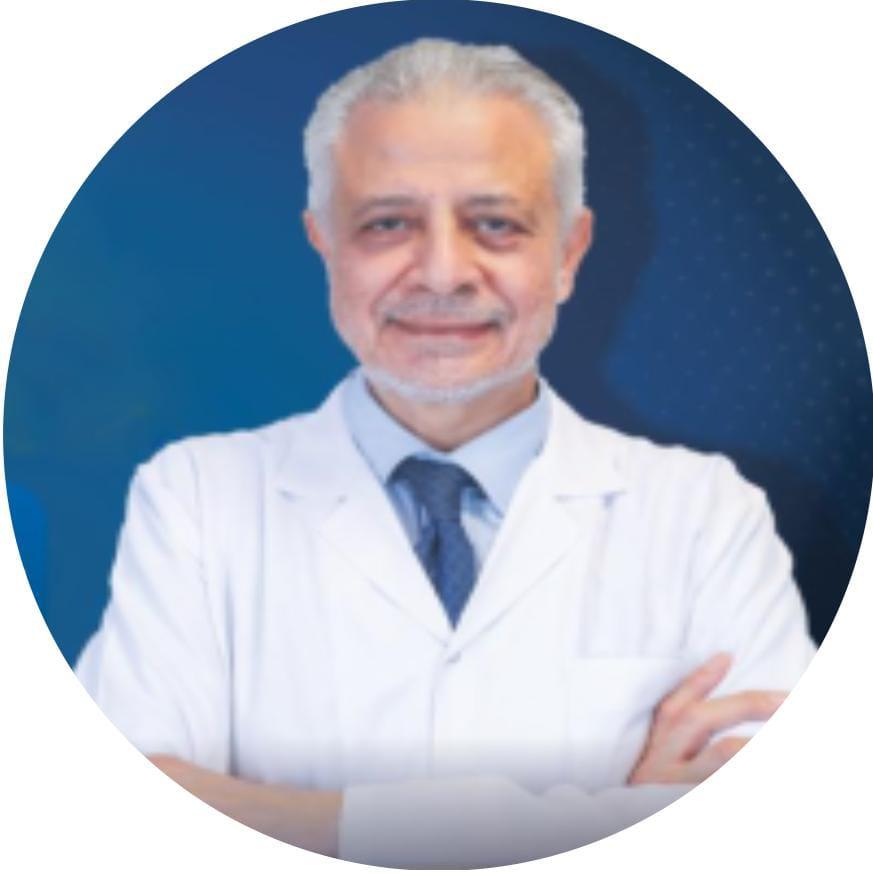Dr. Abdel Moneim Sami El Ramly
Chest and Allergy Consultant

- Name: Dr. Abdel Moneim Sami El Ramly
- Phone: 01010050011 01010010023
- Email: alsahrqpolyclinic.com
- City: Cairo
- Area: Maadi
Dr. Abdel Moneim Sami El Ramly
Consultant Chest and Allergy
Certificates and Qualifications:
Consultant Chest and Allergy
Graduated from Ain Shams University
Member of the Egyptian Society of Immunology and Allergy
Position:
Director of Chest and Allergy Center
Professional Experience:
More than 20 years of experience in the field of Chest and Allergy Medicine
Treatment of complex cases related to respiratory diseases and allergies
Diagnosis and treatment of chronic and complex heart diseases
Specialized Medical Services:
Chest and Allergy Diseases:
Management and treatment of asthma and allergies
Diagnosis and treatment of bronchitis and chronic lung diseases
Follow-up of cases of patients with chronic obstructive pulmonary disease (COPD)
Evaluation and treatment of respiratory infections
Cardiovascular Diseases:
Diagnosis and treatment of angina pectoris and heart attacks
Management of arterial and pulmonary hypertension
Treatment of heart valve diseases such as valve stenosis and rheumatic diseases
Follow-up and treatment of cases of heart failure and coronary artery disease
Evaluation and follow-up of cases after dilatation And the installation of stents in the arteries of the heart
Cardiological examinations and evaluations:
Performing a normal electrocardiogram and stress test
Performing an echocardiogram (ultrasound)
Analysis of continuous electrocardiogram data (Holter)
Coronary artery catheterization from the hand and expansion of valves using interventional catheterization
Performing accurate examinations to evaluate heart function and determine appropriate treatment
Intensive care:
Providing intensive care for critical heart and chest cases
Follow-up and treatment of emergency cases that require rapid intervention and accurate care
Cardiology for children and adults:
Treatment of congenital and acquired heart diseases in children
Providing comprehensive care for heart diseases in adults, including chronic and complex heart diseases
Location and address:
Address: Al-Nasr Street, Al-Lasliqi Division, behind Total Gas Station - Al-Sharq Specialized Clinics
Telephone numbers: 01010010023 - 01010050011
Website: alsahrqpolyclinic.com
FAQ
Pneumonia is an infection in the lungs, and it shows through the following symptoms:
1. Cough: It could have mucus or it might be dry.
2. High fever: Fever with chills (feeling cold with heat).
3. Difficulty breathing: Feeling like you can't take a deep breath.
4. Chest pain: The pain gets worse when you breathe deeply or cough.
5. Fatigue and exhaustion: Feeling extremely tired, unable to get up.
6. Loss of appetite: Not feeling like eating as usual, and sometimes feeling nauseous.
7. Excessive sweating: Especially at night.
8. Muscle aches: Feeling body aches like you have the flu.
9. Mental confusion: Older adults may feel confused or have trouble thinking clearly.
Note: These symptoms can be severe or mild depending on age and health condition.
The recovery time from pneumonia depends on the severity of the condition and the patient's age:
1. Mild cases: Recovery usually takes 1 to 3 weeks.
2. Severe cases or elderly patients: Recovery may take 6 to 8 weeks or longer.
Tips for faster recovery:
1. Get plenty of rest.
2. Stay hydrated by drinking lots of fluids.
3. Follow your doctor’s instructions and take all prescribed medications.
If complications arise or symptoms persist for an extended period, consult your doctor immediately to prevent further health issues.
Pneumonia is an infection that affects the lung tissue itself. This means the air sacs in the lungs become inflamed and may fill with fluid or pus. Its symptoms are clear and include:
1. High fever with chills.
2. Severe coughing, often accompanied by mucus or phlegm.
3. Difficulty breathing, and sometimes chest pain during deep breaths or coughing.
Bronchitis, on the other hand, is an inflammation of the tubes that carry air to the lungs (bronchial tubes). It’s often caused by viral infections or continuous smoking. The main symptoms are:
1. Persistent cough (which may be dry or produce mucus).
2. A feeling of tightness or mild pain in the chest.
3. Wheezing sounds when breathing.
4. General fatigue and exhaustion.
In summary, pneumonia directly impacts the lungs and tends to be more severe, while bronchitis affects the airways leading to the lungs and doesn’t involve the lung tissue itself.
Yes, pneumonia can be contagious, especially if it's caused by bacterial or viral infections. The infection can spread from one person to another through:
1. Coughing and sneezing: From an infected person.
2. Direct contact: Such as shaking hands with someone who is sick.
3. Contaminated air: Inhaling air that contains germs.
To reduce the risk of infection, it’s important to wash your hands frequently, avoid direct contact with sick individuals, and wear a mask if you’re in crowded areas or around infected people.
Symptoms of bronchitis may include:
1. Persistent cough: It can be dry or accompanied by mucus.
2. Difficulty breathing: You might hear wheezing (a whistling sound when breathing).
3. Chest discomfort: A feeling of tightness or heaviness in the chest.
4. Fever: A slight increase in body temperature.
5. General fatigue: Feeling tired and drained most of the time.
6. Nasal congestion or sore throat: A stuffy nose or throat pain might occur.
Note: Bronchitis is often caused by a viral or bacterial infection. The cough may persist even after other symptoms improve.
Bronchitis (acute bronchial inflammation) is usually not dangerous if treated properly. However, in some cases, complications can occur, such as:
1. Chronic bronchitis: If it lasts for a long time or if flare-ups are frequent.
2. Underlying health conditions: Conditions like asthma or heart diseases may increase the risk of complications.
3. Age and weakened immune system: The body may be less able to fight off infections.
4. Rare complications: Such as progression to pneumonia or breathing difficulties.
It is important to consult a doctor when symptoms appear to ensure appropriate treatment and prevent complications.
